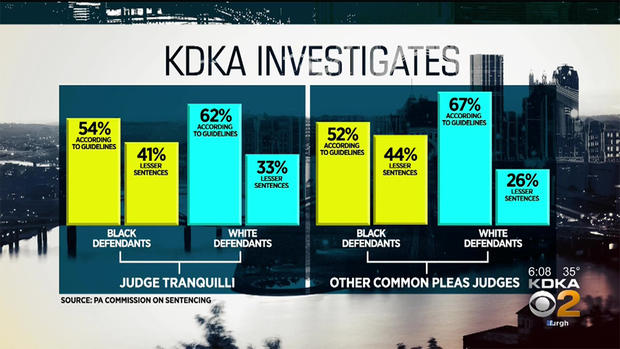KDKA Investigates: Does Judge Mark Tranquilli's Record Reflect Racial Bias?
PITTSBURGH (KDKA) - Judge Mark Tranquilli was re-assigned for allegedly making racist comments in a closed-door conference. But does his record reflect a racial bias?
Judge Tranquilli's fate is in the hands of the state judicial conduct board, which will decide if he ever returns to the bench.
But community leaders have called for his permanent removal after a prosecutor and a defense attorney quoted him as calling a black woman juror "Aunt Jemima" and musing about her having a drug-dealing "baby daddy."
"I would hope that the judicial conduct board would do its due diligence and come back with a ruling that this man should not be serving," said Tim Stevens of Black Political Empowerment.
A tough prosecutor in the district attorney's office, Tranquilli has kept that reputation as a judge, but despite the alleged racist comments, a review of his sentencing does not show that bias.
RELATED STORIES:
- Allegheny County Court Of Common Pleas Judge Mark Tranquilli To Not Preside Over Any Cases
- Complaint Alleges Allegheny County Common Pleas Judge Mark Tranquilli Referred To Black Juror As 'Aunt Jemima'
- Allegheny County Common Pleas Judge Mark Tranquilli Reassigned, Accused Of Making Racially-Charged Remarks
- Pittsburgh NAACP Calling For Investigation Into Judge Who Allegedly Referred To Black Juror As 'Aunt Jemima'
In fact, according to a report prepared by the Pennsylvania Commission on sentencing, he has been tougher on white defendants than on blacks. The commission figures find Tranquilli's record to be in the mainstream with his fellow judges in the sentencing of black defendants and defendants overall.
The report shows in cases involving black defendants 2018 -- Tranquilli sentenced 54 percent according to guidelines and 41 percent to lesser sentences.
That same year the judge sentenced 62 percent of white defendants according to guidelines -- but only 33 percent to lesser sentences.
On average, other common pleas judges sentenced 52 percent of black defendants in the standard range and 44 percent to lesser sentences.
And the judges sentenced 67 percent of white defendants to the standard range and 26 percent to lesser sentences.
On the face, Judge Tranquilli's sentences do not show a racial bias against black defendants. But last week, Duquesne University law professor Bruce Ledewitz said his alleged comments appear to violate this section of the code of judicial conduct: "a judge shall not, in the performance of judicial duties, by words or conduct, manifest bias or prejudice... Based on sex, race, sexual identity or national origin."
"It's impossible for me to imagine him remaining on the bench," says Ledewitz. "At the very least, I could imagine is a suspension for a substantial period of time. I don't see how parties and litigants could feel that they would be treated fairly in that courtroom if these facts were true."








